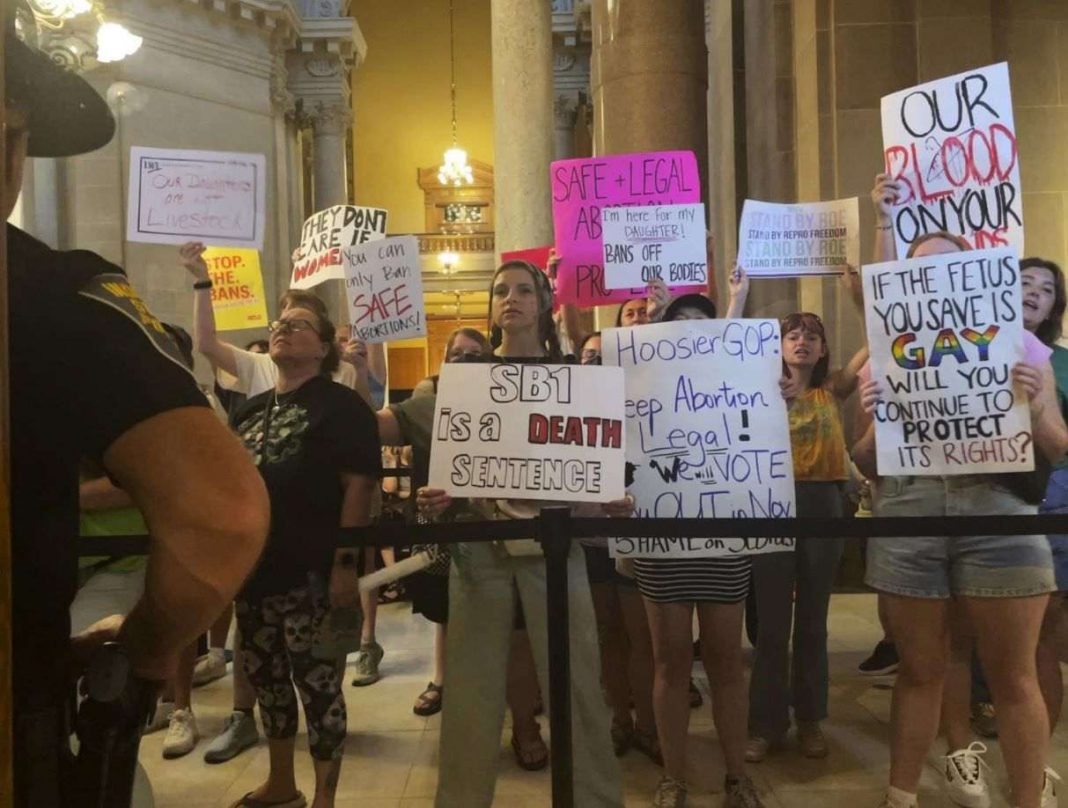On Friday, Indiana became the first state in the nation to approve abortion restrictions following the overturning of Roe v. Wade by the United States Supreme Court. The state’s Republican governor quickly signed a nearly total ban on the procedure shortly after lawmakers approved it, making Indiana the first state in the nation to do so.
The prohibition, which will go effective on September 15th, will include a few exemptions. In circumstances of rape and incest, before to 10 weeks after fertilisation, abortions would be legal. Abortions would also be legal to safeguard the life and physical health of the mother, as well as in cases in which a foetus is identified with a fatal abnormality. The need that victims of rape and incest sign a notarized declaration attesting to an assault, which had previously been suggested, would no longer be enforced.
Under the terms of the law, abortions would be legal to carry out only in hospitals or outpatient centres that are operated by hospitals; thus, the licences of all abortion clinics would be revoked. It is proposed that the present legislation in Indiana, which states that a doctor might lose their licence, be amended to state that a doctor must also lose their medical licence if they conduct an unlawful abortion or fail to make mandatory reports. This would be a stricter interpretation of the law.
After the prohibition was passed by the Senate with a vote of 28-19 and the House of Representatives with a vote of 62-38, he gave his support.
Following the decision made by the Supreme Court in June that abolished constitutional safeguards for the practise, Indiana’s legislature was among the first Republican-controlled state legislatures to discuss the possibility of enacting stricter abortion restrictions.
After the vote, Senate President Pro Tem Rodric Bray told reporters that he was “happy to be accomplished with this,” which he described as “one of the most arduous things that we’ve ever done as a state General Assembly, at least definitely while I’ve been here.”
The legislation was supported by Senator Sue Glick of LaGrange, who said that although she does not believe other states would come to the same conclusion, she does believe that the majority of Indiana citizens favour portions of the legislation.
Some senators from both parties voiced their disapproval of the terms of the law as well as the effect it would have on the state, particularly on women with low incomes and the health care system.
Senator Jean Breaux, a Democrat from Indiana, put a green ribbon on her lapel on Friday to show her support for abortion rights. She made this statement while discussing the state of democracy in the United States.
Senator Mike Bohacek, a Republican who represents Michiana Shores, discussed his daughter, who is now 21 years old and has Down syndrome. Bohacek cast her vote against the measure because, in her opinion, it does not provide sufficient safeguards for disabled women who are the victims of sexual assault.
She would be completely unconsolable if she were to lose her favourite stuffed animal. Imagine forcing her to bear a kid all the way to delivery, he continued just as he began to cry up. He then tossed his papers on the seat in front of him and left the room.
In their testimony, residents seldom, if ever, voiced support for the measure. Those who favour abortion rights said that the law goes too far, while residents who oppose abortion rights stated that it does not go far enough.
The discussions took place at a time when the political landscape of abortion is shifting throughout the country. At the same time, the Republican party is experiencing some internal strife, while the Democrats are anticipating a potential boost during the election year.
After the passage in the House, Republican Representative Wendy McNamara of Evansville, who sponsored the measure and is from Evansville, told reporters that the law would make Indiana “one of the most pro-life states in the country.”
Abortion rights demonstrators frequently screamed loudly outside the chambers, drowning out the politicians’ comments. They carried posters that said things like “Roe roe roe your vote” and “Build this wall between religion and state.”
The political uproar that led to the prohibition in Indiana was sparked by a case involving a rape victim who was just 10 years old and had travelled from neighbouring Ohio to Indiana to have an abortion.
Rep. Ann Vermilion, in the course of her argument against the House measure, denounced the actions of other Republicans who have referred to women who have abortions as “murderers.” She spoke the words, “I believe that the promise of the Lord is for grace and compassion.” “He would not be so quick to rush to judgement on these ladies.”

